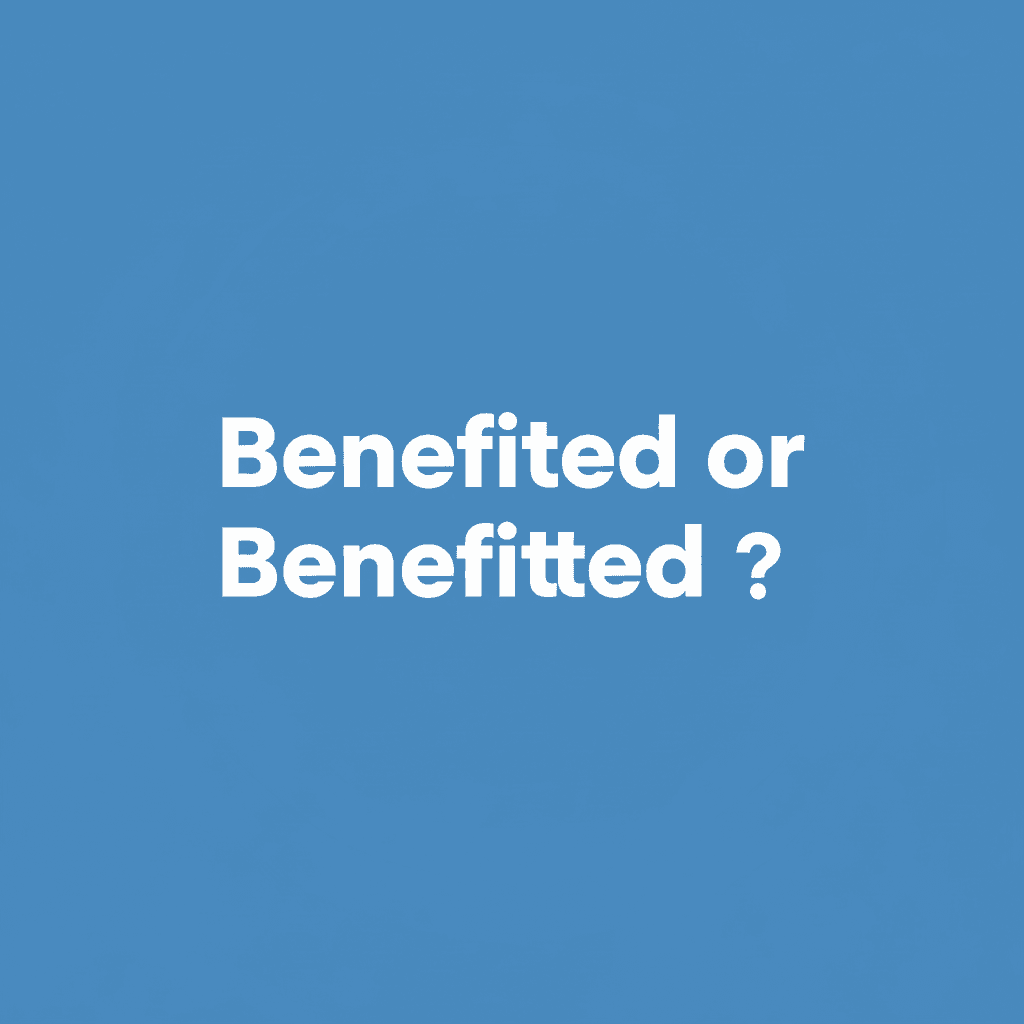Benefited vs. Benefitted: What’s the Difference?
 Both benefited and benefitted come from the verb benefit, meaning to gain, help, or improve from something.
Both benefited and benefitted come from the verb benefit, meaning to gain, help, or improve from something.
The difference between them depends on where you’re writing and which English style you use.
Here’s the short rule:
- Benefited → Standard in American English 🇺🇸
- Benefitted → Sometimes used in British English 🇬🇧 (but less common today)
1. Benefited: The Standard Spelling
Meaning
“Benefited” is the correct and preferred form in American English and most international English writing.
It’s used for both past tense (benefited) and past participle (has benefited).
Examples (10 total)
- She benefited from the new study program.
- The patients benefited from early treatment.
- Our community has benefited from this project.
- He benefited greatly from the training.
- The company benefited from tax reforms.
- I benefited a lot from your advice.
- Students benefited from smaller class sizes.
- The environment benefited from reduced pollution.
- The children benefited from the new policy.
- The economy benefited after the reforms.
🧠 Tip:
If you’re writing for U.S. readers, or want to stay universally correct, use benefited.
“He benefited from the course” ✅
2. Benefitted: British Alternative (Less Common Now)
Meaning
“Benefitted” (with a double t) was historically used in British English, following a rule that doubles consonants when a short vowel comes before them.
However, even in the U.K., “benefited” is now more common and accepted in all formal writing.
Examples (10 total)
- The city benefitted from government funding.
- She benefitted from extra tutoring.
- The patients benefitted from faster care.
- Local shops benefitted from tourism.
- He benefitted from better nutrition.
- The workers benefitted after the strike.
- Our village benefitted from the new road.
- Children benefitted from free meals.
- The country benefitted from new technology.
- Families benefitted from the housing plan.
🧠 Tip:
You might still see benefitted in British publications like The Guardian or The Telegraph, but benefited is becoming dominant everywhere.
3. Quick Comparison Table
| English Variety | Preferred Spelling | Example |
|---|---|---|
| American English | benefited | The company benefited from the merger. |
| British English | benefited (modern) / benefitted (traditional) | The town benefited from tourism. |
| Formal Writing | benefited | The charity benefited thousands. |
| Informal or old style | benefitted | The workers benefitted after reforms. |
4. Why the Difference Exists
The spelling difference comes from how English handles consonant doubling.
In British spelling, some verbs double the final consonant when adding -ed or -ing (like travel → travelled).
But since benefit has the stress on the first syllable (BEN-uh-fit), most modern style guides — even in the U.K. — do not double the t.
So, benefited follows the general rule:
No double consonant if the stress isn’t on the final syllable.
5. How to Remember
👉 Benefited = Modern, correct everywhere.
👉 Benefitted = Older British spelling (avoid in formal U.S. or international writing).
💡 Memory Trick:
“You benefit once — not twice.” → Only one ‘t’ in benefited.
6. Common Mistakes
❌ She benefitted from the new course. (in U.S. writing)
✅ She benefited from the new course.
❌ The policy has benefitted the poor. (in formal writing)
✅ The policy has benefited the poor.
7. Why It’s Confusing
Some English verbs (like travelled and cancelled) keep their double consonants in British English, so writers assume benefitted follows the same rule.
But it doesn’t — because benefit has a different stress pattern.
That’s why benefited is correct in nearly every context today.
Modern AI grammar tools like Humanizey automatically choose the correct form (benefited) based on regional rules and tone — keeping your writing natural, accurate, and consistent.
FAQs
1. Is “benefitted” wrong?
Not exactly — it’s just an older or British variant. But benefited is preferred worldwide.
2. Do official style guides accept both?
Most do, but they recommend benefited (AP, Chicago, Oxford, and Cambridge all prefer it).
3. What about “benefiting”?
Same rule applies: benefiting (one t) is standard; benefitting is rare.
4. Should I match my audience’s spelling style?
Yes — use benefited for U.S. and international readers; benefitted only if your audience expects traditional British English.
Practice: Choose the Correct Form (“Benefited” or “Benefitted”)
(Answers are listed at the end.)
- She has greatly ___ from the training.
- The town ___ from improved transport.
- The students ___ from smaller class sizes.
- Our company ___ after the policy change.
- The environment ___ from recycling efforts.
- He has ___ from years of experience.
- Local farmers ___ from better irrigation.
- The city ___ from new tourism programs.
- The patients ___ under new medical care.
- Everyone has ___ in some way.
Answers
- benefited
- benefited
- benefited
- benefited
- benefited
- benefited
- benefited
- benefited
- benefited
- benefited
